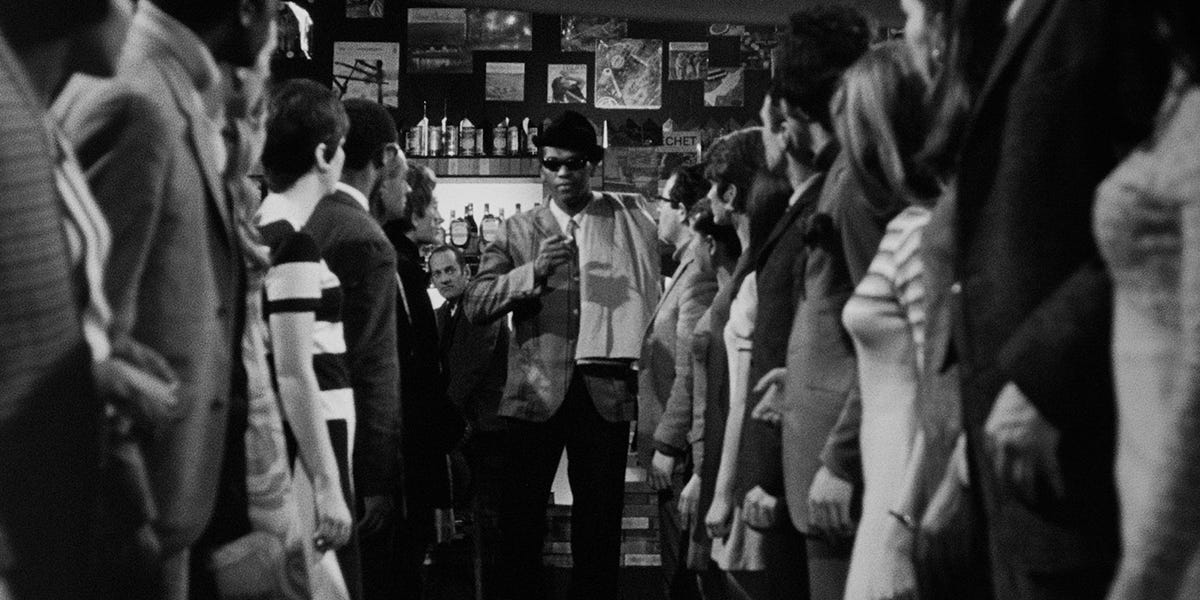The Story of a Three Day Pass
Love it and hate it
The opening music for The Story of a Three Day Pass (1967) informs the viewer that they’re about to watch the coolest movie they’ve ever seen.
The action of the film begins with Turner (Harry Baird, whose attire was provided by Levi Strauss & Co. of San Francisco) making his bed and leaving his bunk in perfect order as he gets ready to go on a short leave from his military outpost in France. He stops by the bathroom to make sure he’s looking sharp. A conversation ensues between Turner and himself via the bathroom mirror, in which he calls himself an Uncle Tom and berates himself for being “trustworthy” in the eyes of the captain, and we all know what “trustworthy” in this context means. (If you don’t know, you’ll find out.) A flashforward to a bipolar commanding officer shows us the reason for his newfound self-loathing: he got the promotion for his “trustworthiness.” The good news that accompanies this: he’s being given a three-day pass, which the captain assumes he’ll use to go to Paris. Turner is warned again, however, that men in his outfit must be able to be trusted. “If I can’t trust you, I’ll bust you,” the commanding officer tells him repeatedly. Turner returns to his quarters, takes off his uniform, gets dressed in his finest, wishes himself luck (literally via trick photography and a mirror), and sets off for Paris.
Melvin Van Peebles passed away in 2021 and left behind a body of work that is only going to grow in esteem as the years wear on. For the Van Peebles uninitiated, The Story of a Three Day Pass is a fantastic place to start. Before his masterful blaxploitation films of the 70s, Van Peebles directed a debut film in-line with the French New Wave, challenging native French directors with one of the movement’s strongest works.
In an excellent write-up by Yasmina Rice for Vulture (spoiler alert), Rice digs into how the film came to be made in France:
Three Day Pass came about as an agile circumvention of the obstacles Van Peebles met in Hollywood. His first two shorts (1957’s Three Pickup Men for Herrick and Sunlight) were rejected, and the only gigs open to him at the studios were elevator operator or dancer. (“This is the insidious part about racism,” he once said in an interview. “You see, when Hollywood refused to take my offer to work, they didn’t say that it was because of any racial reasons; it was because I obviously didn’t have necessary chops, etc. Unfortunately, I had no one to get a second opinion, and so I had to go with their opinion.”)
Once he moved to France, he worked as a journalist and made Three Day Pass based on his own novel, La Permission, making the most of a law that granted French writers a temporary director’s card to adapt their written work…
Van Peebles’s France will look familiar: The Seine is unchanged from the present, complete with green-painted street vendors along the upper promenade. Big open sidewalks, cafes, parks, lusty nightclubs, and street performers; Turner does it all with his first evening in Paris. When Turner arrives at the lounge where he’ll meet Miriam (Nicole Berger), the style of the film shifts into whimsical bordering on experimental territory: Turner literally glides to his spot at the bar. He spots a woman from across the room. A ghost of himself leaves his body toward her. The crowd parts in a trance. Like Moses, he parts a White sea and strides toward her. We’re suddenly in a sunlit field, and they’re running toward each other, arms open and extended. The movie goes to great lengths to ensure that we know explicitly how Turner is feeling at every moment, and it is in this way that we are rooting for him before we even realize it. His self-doubt and self-accusation abate, and the late night in a Paris club is all we care about. His elation shines through dance and song.
Society is meant to be a force for freedom; in the club in Paris, dancing to the music, Turner is liberated from his self-doubt and from the judgment of a country still in the throes of segregation. It is only when he gets to his hotel, and is alone, that the programming of his country begins to set in, and he starts to doubt that he will receive, or even deserves, happiness. Throughout the brisk 87 minutes of The Story of a Three Day Pass, we witness glorious highs and depressing lows, captured by a first-time feature-length director who would go on to be one of the brightest lights in independent Black cinema. I implore you, again, to simply take a taste of this film via the trailer below. If that doesn’t sell you, you’re missing out on the coolest, smartest movie you’ll watch this year.
The underlying statement of the film seems relatively straightforward. Turner starts the film by getting out of bed in the morning and ends the film with an inverse action (and mood). There’s a more subtle lesson at play, however. From his first, Melvin Van Peebles was a pioneer of Black cinema and made a film that he couldn’t find the freedom to make in the United States of the 60s. He looked elsewhere and found financing and freedom in France. When you get freedom, you gotta run with it. It will lead you to the truth.
The Story of a Three Day Pass
Written and Directed by Melvin Van Peebles
1967
87 minutes
English, French


